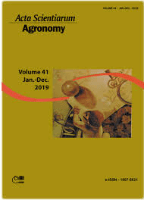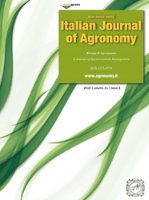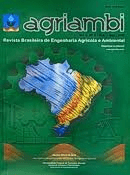
ACTA SCIENTIARUM-AGRONOMY
Scope & Guideline
Advancing agricultural knowledge for a sustainable future.
Introduction
Aims and Scopes
- Crop Production and Management:
Research on improving crop yield and quality through various management practices, such as fertilization, irrigation, and pest control. - Genetic Improvement and Breeding:
Studies focusing on genetic diversity, breeding techniques, and genetic improvement strategies for various crops to enhance resistance and productivity. - Soil Science and Fertility:
Investigations into soil properties, fertility management, and the impacts of agricultural practices on soil health and carbon stocks. - Plant Physiology and Biochemistry:
Research into physiological responses of plants to environmental stresses, nutrient management, and the biochemical processes that influence crop performance. - Sustainable Agricultural Practices:
Exploration of integrated farming systems, conservation agriculture, and sustainable approaches to enhance agricultural productivity while minimizing environmental impact. - Precision Agriculture and Technological Innovations:
Application of advanced technologies, including artificial intelligence and remote sensing, to enhance agricultural practices and decision-making.
Trending and Emerging
- Climate Resilience and Adaptation:
Increasing emphasis on research that addresses the impact of climate change on crop production and the development of resilient agricultural systems. - Digital Agriculture and Data Analytics:
Growing interest in the use of big data, machine learning, and smart farming technologies to optimize agricultural practices and enhance productivity. - Soil Health and Carbon Sequestration:
Research focusing on practices that improve soil health and promote carbon sequestration, reflecting a global priority on sustainability and climate change mitigation. - Biotechnological Innovations:
Emerging studies on genetic engineering, CRISPR technology, and other biotechnological advancements aimed at crop improvement and pest resistance. - Integrated Pest Management (IPM) Strategies:
A rising trend towards research on IPM practices that combine biological, cultural, and chemical methods to manage pests sustainably.
Declining or Waning
- Traditional Pest Control Methods:
Research on conventional pest management strategies has diminished, possibly due to an increased focus on integrated pest management and biocontrol methods. - Single Crop Systems:
Studies centered on monoculture practices are becoming less frequent as there is a growing recognition of the benefits of crop rotation and intercropping for sustainability. - Chemical Fertilization Practices:
There is a noticeable decrease in research focusing solely on chemical fertilizers, reflecting a shift towards organic and sustainable fertilization strategies. - Basic Phenotypic Characterization:
Research that primarily characterizes phenotypic traits without integrating genetic or molecular approaches is declining in favor of more comprehensive studies. - Regional Case Studies:
Fewer publications are focused solely on localized agricultural practices, as there is a trend towards broader, comparative studies that could have wider applicability.
Similar Journals

Pesquisa Agropecuaria Tropical
Exploring the forefront of agronomic research.pesquisa Agropecuaria Tropical is a premier Open Access journal dedicated to advancing the knowledge and practices within the field of agronomy and crop science. Since its inception in 1971, this peer-reviewed journal, published by the Universidade Federal de Goiás, has played a pivotal role in disseminating high-quality research from Brazil and beyond. Operating under an Open Access model, it ensures that scholarly articles are freely accessible, thereby fostering greater collaboration and innovation. With a Scopus ranking placing it in the 32nd percentile among its peers in agricultural and biological sciences, and a current classification in the Q3 category of agronomy and crop science, the journal serves as an essential resource for researchers, professionals, and students alike. As it continues its publication journey from 2010 to 2024, it remains committed to contributing valuable insights and advancements in the agricultural sector, ultimately influencing sustainable practices and food security.

AGROCIENCIA
Exploring the intersection of agronomy and sustainability.AGROCIENCIA, published by COLEGIO POSTGRADUADOS, is a key journal in the fields of agronomy, animal science, and environmental science in Mexico. With an ISSN of 1405-3195 and an E-ISSN of 2521-9766, this journal has been a crucial platform for disseminating research findings since its inception in 2000. Operating from Montecillo, Estado Mexico, it provides an outlet for scholars and practitioners to share innovations and insights that directly impact agricultural practices and environmental sustainability. Despite its current categorization in the Q4 quartile across multiple disciplines, AGROCIENCIA strives to elevate the quality and reach of research, fostering a collaborative approach to tackle pressing issues within the agricultural sciences. Access options are primarily through institutional subscriptions, allowing for a diverse audience of researchers, professionals, and students to engage with the latest studies aimed at advancing knowledge in the agricultural sector. As the journal converges towards its 2024 milestone, it remains dedicated to enhancing scientific inquiry and promoting effective solutions within its discipline.

Revista Brasileira de Ciencias Agrarias-Agraria
Empowering research in agricultural and biological sciences.Revista Brasileira de Ciencias Agrarias-Agraria is an esteemed academic journal published by the Universidade Federal Rural de Pernambuco, dedicated to advancing the field of agricultural and biological sciences. With a focus on disseminating high-quality research, this journal plays a pivotal role in fostering knowledge exchange within the agricultural community, particularly in Brazil and beyond. As a Q3 ranked publication in the Agricultural and Biological Sciences category, Revista Brasileira de Ciencias Agrarias-Agraria contributes to the growing body of literature by featuring insightful articles from both emerging and established researchers in the field. The journal has been consistently published since 2011 and is committed to open access principles, ensuring that research findings are accessible to a wide audience. Researchers, professionals, and students will find this journal an invaluable resource for deepening their understanding of current trends and innovations in agriculture.

Italian Journal of Agronomy
Bridging theory and practice in agricultural innovation.The Italian Journal of Agronomy is a prestigious, peer-reviewed outlet dedicated to advancing research and scholarship in the field of agronomy and crop science. Published by PAGEPRESS PUBL in Italy, this journal is committed to providing a platform for the dissemination of high-quality research since achieving its Open Access status in 2006. With an ISSN of 1125-4718 and an E-ISSN of 2039-6805, it is recognized for its contribution to the scientific community, boasting a commendable Q2 category ranking in Agronomy and Crop Science as of 2023. The journal's impressive Scopus ranking places it in the 75th percentile within General Agricultural and Biological Sciences and the 69th percentile in Agronomy and Crop Science, reflecting its significant impact and relevance. Covering a wide range of topics relevant to agriculture, from sustainability practices to innovative farming techniques, the Italian Journal of Agronomy serves as an essential resource for researchers, professionals, and students seeking to enrich their knowledge and contribute to the advancement of the agricultural sciences.

Journal of Agricultural Sciences-Tarim Bilimleri Dergisi
Empowering Research in Plant and Animal SciencesJournal of Agricultural Sciences - Tarim Bilimleri Dergisi, published by Ankara University, Faculty of Agriculture, is a prominent open-access journal that has been fostering academic dialogue in the field of agricultural studies since 2010. With ISSN 1300-7580 and E-ISSN 2148-9297, this journal contributes significantly to the scientific community, particularly within the realms of agronomy, crop science, animal science, and plant science. As of 2023, it holds a Q3 classification in Agronomy and Crop Science, and Q4 in both Animal Science and Zoology and Plant Science, indicating its growing influence and dedication to advancing research in these areas. Situated in Turkey, this journal serves as a vital platform for scholars, professionals, and students, inviting submissions that enhance our understanding of agricultural innovation and sustainability. With a commitment to disseminating high-quality research, Journal of Agricultural Sciences ranks favorably within Scopus, providing an invaluable resource for exploring evolving agricultural paradigms.

Bioagro
Fostering collaboration for transformative agricultural practices.Bioagro is an esteemed academic journal dedicated to advancing research in the field of Agricultural and Biological Sciences. Published by the University Centroccidental Lisandro Alvarado in Venezuela, this journal has made significant strides since its inception in 2008, with a focus on delivering high-quality research publications that address contemporary challenges in agriculture and biology. Recognized for its contributions, it holds a Q3 ranking in the Agricultural and Biological Sciences (miscellaneous) category as of 2023, and it ranks #125 out of 221 in its field, placing it in the 43rd percentile. Although it operates on an Open Access model, Bioagro strives to provide broad access to innovative research, thereby fostering collaboration and knowledge dissemination among researchers, professionals, and students. With a commitment to include a wide range of topics, the journal aims to be a pivotal platform for exploration and dialogue in agricultural sciences, ensuring that key findings reach both scientific and practitioner audiences. Located in Barquisimeto-Cabudare, Lara, Venezuela, Bioagro invites submissions that contribute to the global discourse on sustainable practices and innovations in agriculture.

Egyptian Journal of Agronomy
Advancing Agricultural Science for a Sustainable FutureEgyptian Journal of Agronomy, published by the NATL INFORMATION DOCUMENTATION CENT, ACAD SCIENTIFIC RESEARCH & TECHNOLOGY, serves as a pivotal platform for researchers, professionals, and students focusing on various disciplines within the agricultural sciences, including agronomy, soil science, horticulture, and ecology. With an ISSN of 0379-3575 and E-ISSN of 2357-0288, the journal aims to bridge the gap in knowledge and innovation in the field with its comprehensive studies and frameworks. While the journal is currently categorized in low Scopus ranks, indicating immense potential for growth in influence and impact, it remains dedicated to providing quality research and fostering advancements in agronomic practices. Set in Egypt, a hub for agricultural research, the journal is committed to reflecting the regional and global challenges in agriculture. The Egyptian Journal of Agronomy is a vital resource for anyone engaged in the evolving landscape of agricultural science, offering insights that promote sustainable practices and address current issues facing the sector.

International Journal of Plant Production
Empowering global food security with cutting-edge plant science.International Journal of Plant Production, published by SPRINGER in Switzerland, serves as a leading platform for the dissemination of innovative research in the fields of Agronomy, Crop Science, and Plant Science. With an ISSN of 1735-6814 and an E-ISSN of 1735-8043, this journal has maintained its reputation by achieving a Q2 quartile ranking in both categories as of 2023, alongside notable Scopus rankings placing it in the top quartiles of its fields (Rank #105/516 and Rank #88/406, respectively). The journal's scope encompasses a wide array of topics vital to sustainable agriculture and plant production systems, making it a critical resource for researchers, professionals, and students striving for advancements in these disciplines. By fostering open scientific dialogue and supporting cutting-edge research, the International Journal of Plant Production is committed to contributing to the resolution of global food security challenges, enhancing agricultural practices, and promoting ecological sustainability.

Revista Brasileira de Engenharia Agricola e Ambiental
Connecting Researchers for a Sustainable Future in AgricultureRevista Brasileira de Engenharia Agricola e Ambiental, published by the Universidade Federal de Campina Grande, serves as a pivotal platform for researchers and professionals in the fields of agricultural and biological sciences, agronomy, and environmental engineering. With an open-access policy since 2000, this journal aims to foster global dissemination of innovative research and practices, ensuring that high-quality findings are accessible to all. Operating in Brazil, it holds notable rankings, including Q2 in the categories of Agricultural and Biological Sciences (miscellaneous) and Agronomy and Crop Science, indicating its strong academic impact and influence within these fields. As of 2023, it ranks #68 out of 193 in Agricultural and Biological Sciences and #188 out of 406 in Agronomy and Crop Science, representing its commitment to advancing scientific knowledge. The journal primarily focuses on publishing studies that address challenges in agricultural engineering and environmental sustainability, making it an essential read for students, researchers, and professionals who are dedicated to innovation and excellence in these dynamic fields.

Revista Caatinga
Fostering Collaboration in Agricultural and Biological ResearchRevista Caatinga is a premier open-access journal published by Universidade Federal Rural do Semi-Árido (UFERSA), dedicated to the dissemination of significant research within the field of Agricultural and Biological Sciences. Since its inception in 2006, the journal has aimed to bridge the knowledge gap in various aspects of agricultural practices and biological phenomena, making vital contributions to the scientific community. With its publications indexed in Scopus and holding an impressive Q2 categorization in the competitive landscape of agricultural sciences, the journal ranks within the top half of its category (100/221), demonstrating a commitment to quality scholarship. The journal is based in Brazil and covers a wide array of topics relevant to both local and global agricultural challenges. By fostering open access, Revista Caatinga ensures that vital research is available to a broad audience, promoting knowledge sharing and collaboration among researchers, practitioners, and students around the world.